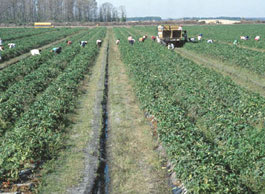Increased productivity, greater profits, and reduced cost. It is no wonder why some may consider the industrial shift in agriculture as one of the greatest successes in human history. Nonetheless, with our focus to increase productivity and profitability, we have greatly disregarded the consequences this innovation has brought to our economy, biodiversity and environment for the future years to come.
 |
Since agriculture and food production are essential factors to human survival, agriculturalists, through the use of technology, began to develop efficient and innovative ways to improve the production of food for our world’s growing population. These methods, which have become dominant in our society, evolved to what we now call as “Industrial Agriculture”. This type of intensive farming involves the purchase of machinery in order to reduce human and animal labour. Farmers today have the ability to produce an adequate amount of crops and livestock, while minimizing cost, the labour and the amount of production time. There is no doubt that industrial agriculture is beneficial. However, when looking at the pros and cons, it seems that its benefits cannot outweigh the disadvantages.
 |
But, how much do we actually know about these methods? We adore the idea of having access to cheap and abundant foods.However, we tend to disregard its negative impacts to society.With our growing population and high demand in food production, the agricultural industry has encouraged industrialization to keep up with this rapid growth, and even go further to provide us with more than enough food than we need. It seems that our greed has pushed us to desire more, even if it means jeopardizing lives. Modernized farming violates animal rights since livestock, such as cows, pigs and chickens are placed in small, filthy conditions where they are vulnerable to infectious diseases, until they are finally slaughtered for our next meal. It also requires the immense use of synthetic fertilizers and pesticides, genetic manipulation, and irrigation water. These methods result to pollution, the depletion of earth’s ozone layer, crops’ vulnerability to insects and diseases, increased production cost, extinction of wildlife, erosion of soil’s natural fertility, loss of diversity, ground water contamination, and health risks due to chemical intake.
 |
Alternatively, sustainable agriculture allows us to receive similar benefits without risking our planet’s well-being. This type of farming focuses on the environmental health by conserving all resources and minimizing waste, while attempting to address social concerns and improve economic profitability. Its main goal is to produce food without the excessive use of chemicals, which avoids health risks and production costs. Hence, why even allow industrial farming?

With the numerous benefits it has brought to our lives, we tend to ignore the even greater downsides industrial agriculture has on our global economy, not to mention, our environment and the biodiversity we so preciously are attempting to maintain. It is time for us to put action to fix the damages caused by industrial farming. Thus we must tell ourselves and others that sustainable farming is the only way to go!

WORKS CITED LIST:
"What is Sustainable Agriculture?" UC Sustainable Agriculture Research and Education Program. N.p., n.d. Web. 28 Mar. 2011. http://www.sarep.ucdavis.edu/concept.htm
"The Costs and Benefits of Induatrial Agriculture." Alberni Environmental Coalition. N.p., n.d. Web. 28 Mar. 2011.http://www.portaec.net/library/food/costs_and_benefits_of_industrial.htmlhttp://www.brighthub.com/environment/science-environmental/articles/73606.aspxhttp://www.small-farm-permaculture-and-sustainable-living.com/advantages_and_disadvantages_organic_farming.htmlCOMMENTED BLOGS:Dyrosha Ithayaneesenhttp://dyrosha-bioblog.blogspot.com/2011/02/feeding-growing-population-vs.html?showComment=1301356591210#c2730629290114731929Kendra Spencer-Colehttp://itsbiotime.blogspot.com/2011/01/industrial-vs-sustainable-agriculture.html?showComment=1301356812024#c2336582292284775283